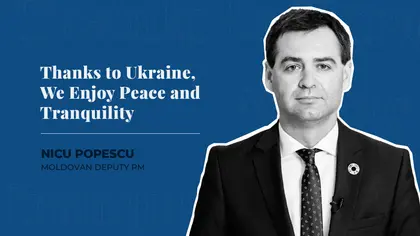Local elections will be held in the Republic of Moldova in autumn 2023. Against this background, the tension in the country is increasing, because the Kremlin also has its own interests here, and therefore influence.
JOIN US ON TELEGRAM
Follow our coverage of the war on the @Kyivpost_official.
According to RISE Moldova journalist Vladimir Thorik, there is a rather considerable risk that pro-Russian forces will win the elections. For example, in the Gagauzia autonomous region, where elections have already been held, a pro-Russian candidate and supporter of the fugitive oligarch Ilan Shor came to power.
Russian forces are taking advantage of the difficult economic situation in Moldova, which has an inflation rate of more than 30 percent, and the gas tariff has risen 5 times. In order to prevent pro-Russian forces from coming to power, the Moldovan government is working hard on the process of European integration and relevant reforms.
Kyiv Post spoke with the Deputy Prime Minister of Moldova, Minister of Foreign Affairs and European Integration Nicu Popescu about Moldova’s action plan for reforming and preparing to join the Union, solving territorial issues, as well as about the consequences of the likely victory of pro-Russian forces in local elections.
Could Moldova’s pro-European course be destroyed if pro-Russian forces win elections in the fall?
I think that over the past 30 years, Moldovan society has proved that it wants to live in a democratic, free and European country. Since local authorities continue to address local issues, we don’t expect any major political consequences from the result of these elections, whatever it may be.

Polish PM Says Ukraine Peace Talks Could Start This Winter
Russia openly opposes Ukraine’s accession to the EU. It follows that the Russian leadership also wouldn’t accept the accession of the Republic of Moldova either. How do you see European integration against this background?
For 30 years, our society has repeatedly proved its pro-European point of view. Russia has its own interests, but the Moldovan government listens to its people.So, I believe that our ability to bring our country closer to the European Union is very strong.
We are also working to ensure peace and stability, including socio-economic stability. And we are strengthening our ability to deal with hybrid threats.
Of course, thanks to the Ukrainian ability to resist the enemy, directly, on the front line, thanks to the Ukrainian people, army and government, we enjoy peace and tranquility in Moldova. And we are deeply grateful for the sacrifice and courage of Ukrainians.
Since Russia isn’t having significant success in Ukraine, and Russian forces are weakening, this adds to our resilience and strength to fight the Russian threat. Because at least one Russian attempt to destabilize Moldova has become less.
Finally, we are not alone. With us is the entire European continent, the European Union, as well as partners on the other side of the Atlantic, the United States, Canada, Japan and other countries that express their support for us.
Given that Moldova wants to join the European Union, why didn’t the country leave the CIS completely rather than chose a gradual exit?
We are following the same procedure that was used in Ukraine, we have denounced some agreements signed with the CIS organization. We will also terminate other agreements at a later stage. Let’s see what happens next.
Ukraine has repeatedly said it’s ready to help resolve the issue of Transnistria if the Moldovan government asks. What’s your response to this? How do you see joining the EU, having an unresolved situation in Transnistria?
First, resolving the separatist conflict isn’t easy. It’s especially difficult when Transnistria’s continuously supported by Russia. We’ve been trying to resolve this issue for the last 30 years. However, we’re determined to resolve it peacefully, that is, through diplomacy and negotiations.
Because over the past 50 years, I think it’s important that we’ve been able to maintain peace on our territory. It’s very important for us to continue our efforts to reintegrate the Republic of Moldova by peaceful means.
Moldova’s accession to the EU: how is your reform process going and what are your most significant successes?
Last year, when we received candidate status, we received nine recommendations from the European Commission on priorities that we need to focus on if we want to get closer to opening accession negotiations. Most of these recommendations relate to judicial reform, fighting corruption, capacity building, healthcare sector reform, and so on.
We need to focus most of all on judicial reform. So, now we are working very closely with the European Commission on ways to move forward.
Just recently, we were visited by the representative of the European Commission and the director of the junior European Command, with whom we reviewed one by one the numerous actions that we’ve taken to meet the Commission’s recommendations.
I could give you a really long list of action plans, passing bills, and so on. But I want to mention only some very noticeable changes in the life of this country. It’s not been easy, but the result is clear progress towards a fairer and more functional judicial sector.
We also now have a pre-elected International Committee that prevents obstruction of work with members of the Council, the High Council of Magistrates. And we are cooperating with foreign partners. Since the newly appointed six senior judges are not corrupt, we are now active in all our reforms.
The European Union says this is a great start and we’ve made great progress. However, we still have a long way to go in many sectors.
Our goal is to complete the implementation of reforms by the fall of this year so that we can get a recommendation to start accession negotiations.
You can also highlight the text and press Ctrl + Enter






